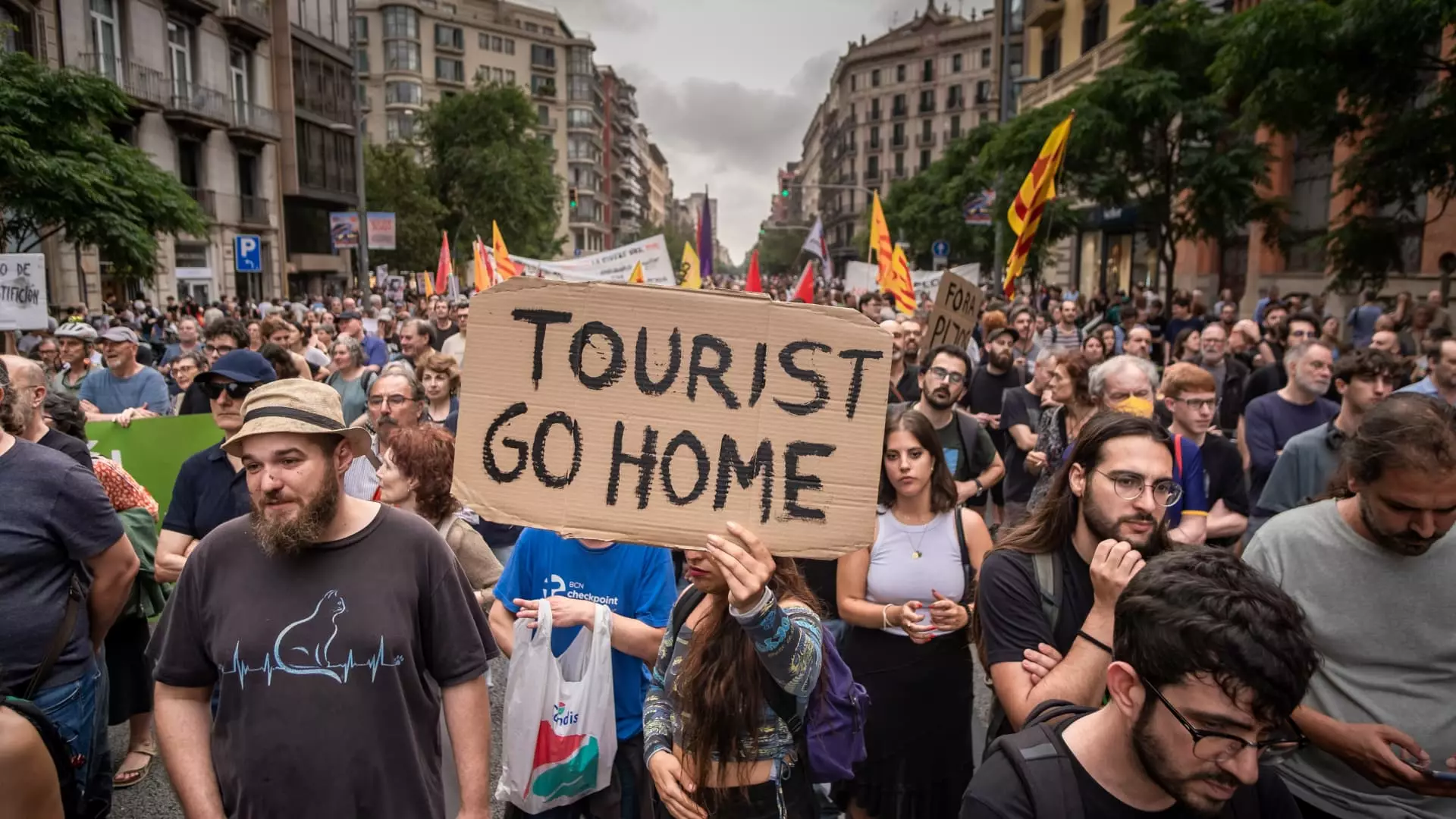In recent years, the burgeoning tourism industry has emerged as a double-edged sword in cities like Barcelona. The allure of summer sun and cultural vibrancy draws millions of visitors, yet this influx can incite local discontent. On July 6, a notable protest erupted in Barcelona led by anti-tourism advocates, calling for a reduction in tourist numbers with chants of “Tourists go home!” This demonstration highlighted a deep-seated tension between the economic benefits of tourism and the quality of life experienced by residents. Just weeks later, Spain’s tourism board adopted a contrasting tone in its promotional campaign inviting travelers back with the message: “Spain: the summer you’ll want to repeat every year.” This provocative divergence serves as a microcosm for the broader challenges faced by popular tourist destinations.
The Economics of Tourism and Community Response
Data reveals a resilient tourism sector in the face of local protests. Despite the demonstrations in July and similar occurrences this year, international arrivals to Spain surged. An impressive 10.9 million visitors flocked to the country in August alone, marking a 7% rise compared to previous years, as reported by Spain’s National Statistics Institute. Economically, tourism accounts for a significant portion of Barcelona’s GDP—approximately 14%. Nevertheless, the financial influx comes at a tangible cost to local communities, whose sentiments often tilt toward frustration and disillusionment as they navigate the realities of overtourism.
Travelers to regions like the Balearic Islands and Catalonia remained undeterred, with 2.4 million and 2.3 million international visitors, respectively, this past August. Interestingly, a survey conducted by the Balearic tourism board revealed that 89% of American travelers were either unacquainted or indifferent to the protests, leading to an overwhelming 70% who felt such demonstrations had no bearing on their travel plans. This lack of awareness and concern from visitors underscores a disconnect between tourist perspectives and local grievances.
While the protests did manage to engender a temporary decline in tourism interest—with RateGain noting a 23% drop in hotel bookings shortly after the July demonstrations—the transient nature of this impact is telling. As booked arrangements bounced back within weeks, the resilience of the travel market raises questions about the long-term effects of such activism. Daniel Pardo Rivacoba, representing the Assembly of Neighbourhoods for Tourism Degrowth, insists that these protests were not mere expressions of frustration but rather tactical movements toward a larger agenda aimed at sustainable tourism practices.
The urgent list of 13 demands presented by protest organizers calls for significant changes, including the cessation of airport expansion and a strategic shift away from economically motivated tourism promotion. Ironically, as local representatives outline additional measures to mitigate overtourism—like the “Government Measure for Tourism Management 2024-2027″—these efforts have been characterized by critics as superficial, involving only cosmetic changes instead of genuine reform.
The call for a paradigm shift in tourism management is gaining traction in cities grappling with the challenge of overtourism. As the city council invokes strategies such as crowd monitoring using mobile technology, critiques regarding their efficacy persist. Rivacoba dismisses these measures as insufficient; he and fellow advocates argue for an outright reduction in tourist volumes as the only avenue toward fostering a sustainable community environment.
The portrayal of tourists as unwittingly intrusive elements in the urban ecosystem generates tension, further amplified by rising costs of tourism-related taxes, such as the recent 4-euro surcharge introduced by the city council. Advocacy groups see these financial strategies as methods to generate income rather than meaningful efforts to control tourism growth.
Despite differing experiences, opinions surrounding tourism have shifted markedly among locals. Rivacoba observes a growing consensus against the previously unchallenged notion that “tourism is good for everyone.” In recent years, more Barcelonians echo discontent regarding the ramifications of mass tourism on their quality of life. With increasing media attention focusing on these sentiments, protests have transitioned from isolated events to a rallying cry for change.
Beyond Barcelona, broader networks of concerned citizens and organizations are coordinating efforts to mobilize collective action against tourism exploitation, demonstrating the surging power of community solidarity across geographical boundaries.
As the tensions between economic incentives and resident well-being continue to surface in popular tourist destinations like Barcelona, a serious conversation is needed regarding the future of tourism management. Industry leaders, such as Booking Holdings’ CEO Glenn Fogel, emphasize that alleviating overtourism is primarily the responsibility of local governments—a sentiment echoed by local advocates. Collaboration among stakeholders—governments, residents, travelers, and the tourism industry—will be crucial in orchestrating a sustainable solution that balances economic benefits with the needs and sentiments of local communities. In this evolving dynamic, understanding and addressing the fears and frustrations of residents will be essential in maintaining the very charm that initially draws countless tourists to Barcelona’s magnificent streets.

